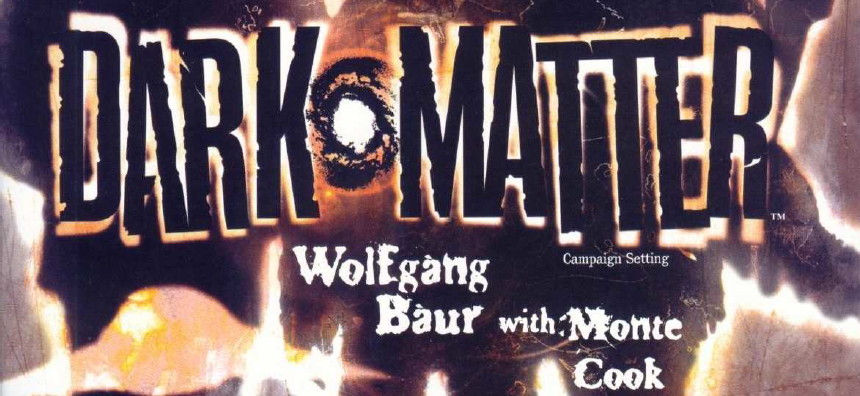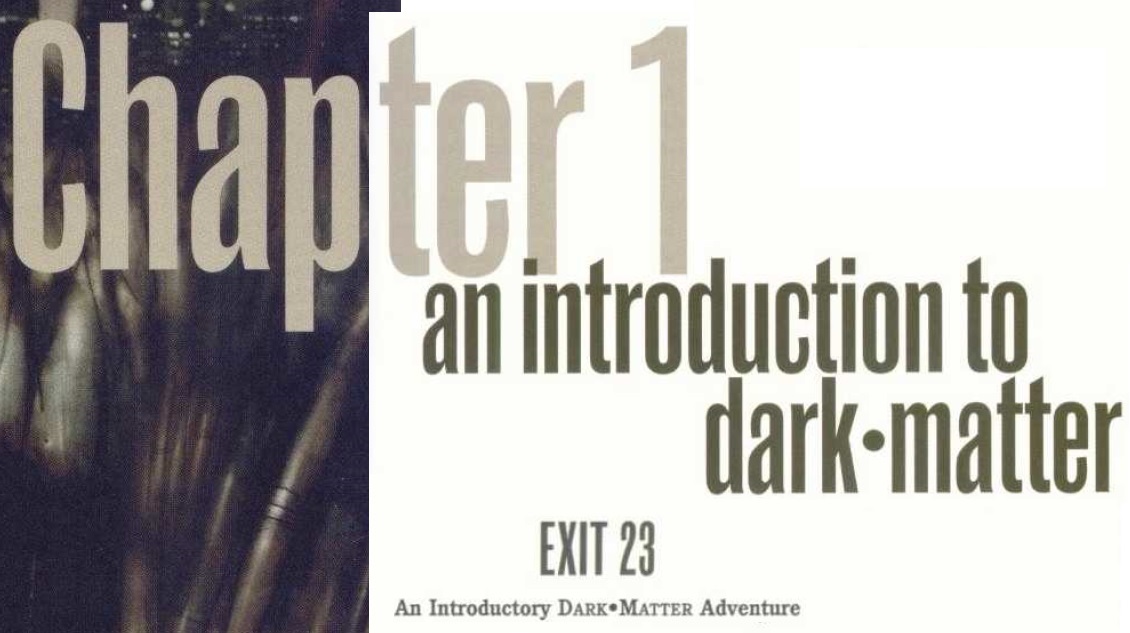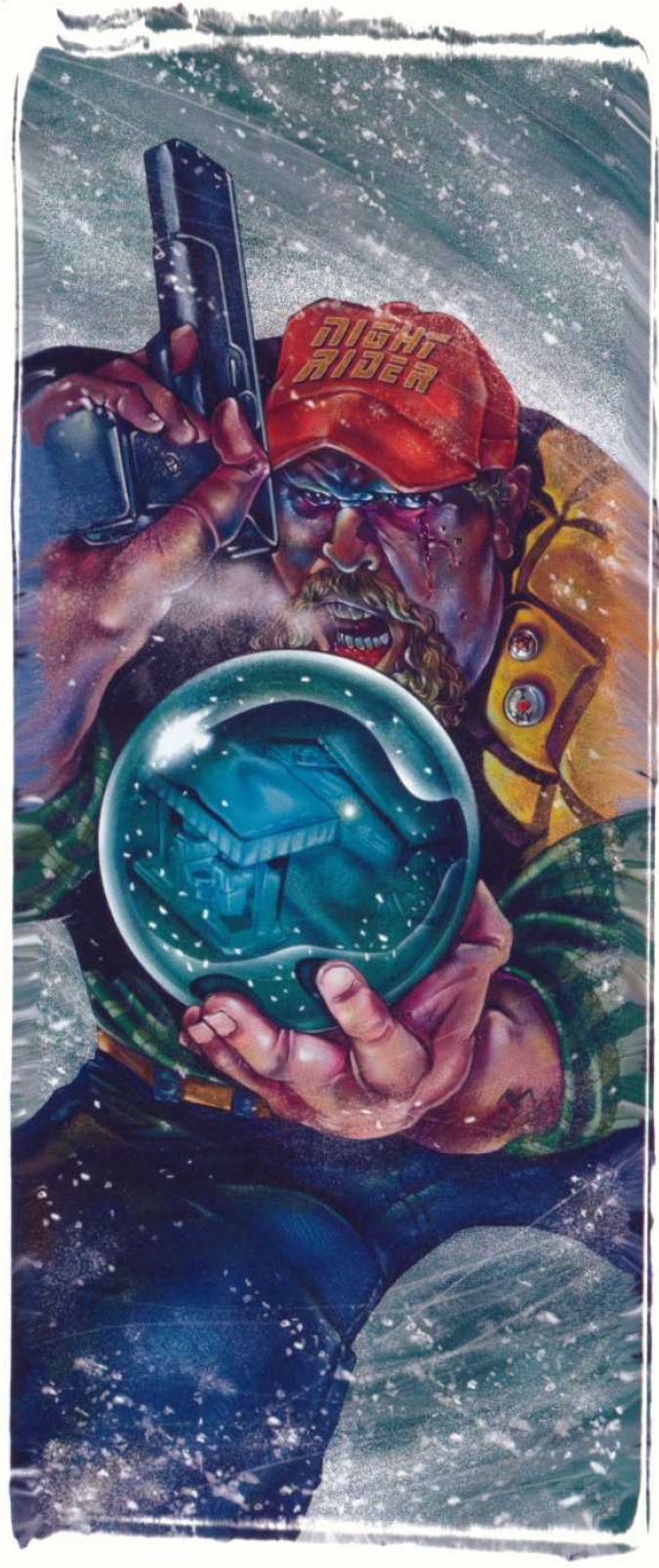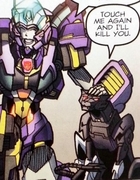|
Alien Rope Burn posted:
It does.   It's not even subtle where that design actually comes from.
|
|
|
|

|
| # ? Apr 23, 2024 15:55 |
|
Warhammer Fantasy Roleplay: Tome of Salvation King Taal and Mother Rhya Taal and Rhya are unusual in that they are usually worshiped together, and their cult is considered a single entity even if individual priests and priestesses tend to emphasize one or the other. They are also unusual in being very gendered Gods; Taal represents the masculine and Rhya the feminine, and the priests and priestesses keep to this. Taal and Rhya are likely the oldest nature Gods of the Empire, having been worshiped since pre-Imperial days. During the tribal period, they were originally a single being, Ishnernos, but split apart into a sacred couple over the years of worship. Taal is one of Ulric's traditional mythic rivals for the title of King of the Gods, and there are many myths of the two competing with one another, though they always come together to fight Chaos in the end. Taal tends to be emphasized over his wife specifically because Talabheim is one of the great cities of the Empire and the center of his cult, but anyone who worships Taal worships Rhya as well. Taal represents the power and majesty of nature, appearing as a great horned hunter or stag. He represents life's power, providing the spark that makes the heart pump and the urge to survive and create. He rules over the beasts of the wood and guides the arrows of hunters and the axes of warriors, and he also stands as the patron of the transition between childhood and adulthood, which Imperials consider to be the peak of a being's life. Rhya represents cultivation, nurturing, healing, love, and passion. She is the goddess of agriculture and livestock, prayed to by farmers all across the old world, and also a patron of fishermen so long as they fish in fresh water. As goddess of love, she tames the wildness of her husband and brings about wisdom and genuine maturity. She also watches over the fertility of all living things, humans included, and she is the 'wholesome' patron of passion as opposed to Slaanesh. Priests of Taal and Rhya are most loved in the remote and rural areas of the Empire, especially the north and east. They watch over small farming, hunting, and logging communities, providing the sacred rites that will help the orchards and fields give fruit, the woods to grow strong, and the game to be plentiful. They are often the only priests available for truly remote communities, and so take on all the other duties of a priest, advising the people and guarding souls from the dark things that lurk in the woods. Priests and cultists are uniformly woodsmen, hunters, and survivors who spend much of their time away from the Empire's cities and towns. They're also unusual in having a rapport with both the elves of the Laurelorn forest and the Magisters of the Jade and Amber order; they don't consider Jade or Amber wizards much of a deviation from their God and Goddess, and both Orders respect Taal and Rhya. The cult of Taal and Rhya is less involved in the overall politicking of the Empire outside of Taal's veneration in Talabecland and Talabheim, and even there that's more a case of the city and region being holy to Taal rather than Taalites ruling the government. The cult believes in living life to its fullest, that life is a blessing and an inevitable cycle. All things are born, die to feed something else, and hopefully pass along something of themselves in the form of their children and the memory of their life. Taalites and Rhyans also pay close attention to the changing of the seasons and the regularity of nature, and are charged with guarding against unnatural phenomena like Chaos. As mentioned above, they also believe that a life is divided into childhood, adulthood, and old age, and that the transitions between those represent a sacred space for their Gods, who will help a person to gain the most they can from each part of their life. While all Taalites and Rhyans are hardy outdoorspeople, initiation changes depending on which God a person was called to. Both Gods' worshipers will pair a young prospective priest up with an experienced priest to teach them to survive in the wilderness and to show them the ways of the Gods. Taalites are tested on their strength of character, hunting prowess, and ability to survive the harshest parts of the wilds. Both young men and women in the Empire in heavily Taalite communities undergo a rite called the Quickening, where they go out into the woods of the Priests of Taal and get extremely drunk, take hallucinogens, and learn how not to die in a forest. Yes, if you're from a Taalite community your transition to adulthood is going on a several week hunting trip where you take mushrooms and have wild psychedelic visions of nature gods. A Taalite Initiate's training involves more of these visions and rituals, to learn the wisdom of Taal and instill a proper sense of awe at the power of nature. Rhyan initiates forgo the drunken wild partying in favor of fairly normal training where they learn to heal, give counsel, mediate disputes, and advise farmers and fishermen. It ends in a simple celebration and dancing ceremony when the young woman is deemed qualified to become a priestess. Men are forbidden from attending these ceremonies and have increasingly made up wild stories of what actually happens. As noted, Taal and Rhya are always worshiped in tandem outside of their specialized and gendered rites. Each region of the Empire has an assigned pair of Hierarchs, one powerful Taalite and one powerful Rhyan, who are considered of equal rank and authority. During Spring and Autumn, the Hierarch of Rhya rules, and during Summer and Winter, the Hierarch of Taal is in charge, as those are the seasons of their God and Goddess. In some cases, when the Hierarchs squabble, this leads to a seasonal cycle of the two reversing one another's edicts until their conflict can be mediated, but the cult tries to pair Hierarchs to keep this sort of arguing to a minimum. Beneath these Hierarchs are the High Priests, who are assigned the care of specific holy places and sacred groves. Beneath them are the normal Priests, who do the grunt-work of assisting local communities and tending to the holy places at the direction of the High Priests. Individual Priests tend to have a great deal of latitude, and are encouraged to disagree with their superiors if they can make a case to their peers; competition is an important part of nature, and so is growing up. What is low today will be high another day, after all. The main sects of Taal and Rhya are the Kin of Taal, the Bringers of Bounty, and the Wardens. The Kin of Taal are the archetypal keepers of 'men's magic', the ones who direct the Quickening ceremonies and who revel about the woods, reminding people of the power and joy of Taal. They are characterized by long hunting trips, massive communal feasts after said hunting trips, gallons of powerful moonshine, sweat lodges, and hallucinogenic substances used to induce wild revelry. Curiously, they are only comprised 'mostly' of men; in general the text can't quite tell if the gender lines between Taalite and Rhyan worship are impermeable but give the impression there are occasional exceptions. Wardens are protectors of the sacred places, bound to keep the secret rituals of Taal and Rhya secret and to battle the beastmen and other despoilers. Your usual fantasy holy warrior ranger types. The Bringers of Bounty are the main sect of Rhyans, blessing the agriculture and festivals of the Empire and helping to see to matters of family and childbirth. They are generally some of the most popular priestesses outside of the Shallyans, admired for their wisdom and sought for their advice on keeping the peace and maintaining families. The Longshanks are the official Templar Order of Taal. They vow never to stay in a place for more than a week, traveling the Empire in a constant hunt for monsters and evil throughout its forests. They serve the Imperial army much like other knightly orders, save they serve as scouts, snipers, and raiders rather than heavy shock cavalry. They are especially beloved in Talabecland, where they have many shrines and pilgrimage routes to protect. As an added note they get Consume Alcohol as one of their Templar bonus skills, so I'd assume they like partying with the Kin of Taal when they get the chance. The Horned Hunters are something of an equivalent of flagellants for Taal, a bunch of crazy people who run around the woods, wearing horns and living by axe and bow alone. They believe that living in the forest in the manner of the proto-Imperial tribes is the only way to truly honor Taal and Rhya, and they tend to be violent and dangerous. They're regarded as a little too touched by the Gods, yet their craziness is still considered sacred. The Daughters of Rhya are interesting; do you remember the Maiden's Charms from the Realms of Sorcery? The magical no-fail birth control that a woman only needs to wear around her neck? These are the priestesses who make them. Officially, they are simply healers, midwives, and counselors on marriage and motherhood. In reality, they teach women how to deal with abusive or difficult marriages, how to avoid unwanted pregnancy, and do what they can to protect victims of domestic abuse. Because of the Maiden's Charms and other 'meddling', they are sometimes accused of witchcraft and 'stealing men's potency'. Next Time: WOLVES! PECS! AXES! CELIBACY!
|
|
|
|
I think 4e separated Taal and Rhya. Priests of each certainly get different rules to follow and different blessings.
|
|
|
|
Warhammer Fantasy Roleplay: Tome of Salvation Chill out Ulric, the God of War, Winter, and Wolves, started out with some dick moves. According to the Book of the Wolf, he is the oldest human God, and he led a tribe of humans known as the Teutogen into the forests of what would become Middenland and directed them to destroy the indigenous forest peoples, killing and enslaving them until little record of them survives. After years of war, he led his people to a flat-topped mountain, and punched the hell out of it to show them they were supposed to live there, producing an ever-burning silver flame that still exists to this day. When the humans reached the mountain, they were confronted by an army of wolves, but refused to back down. Ulric was pleased with this aggression, and chased off the wolves and gave them the mountain that would become Middenheim to be the center of his cult and the grand center of the Teutogen tribal kingdom. Most believe that as long as the flame burns, Middenheim can never fall and Ulric's people will always manage to hold out. They haven't been wrong yet, and Archaon's defeat has only strengthened this belief. Ulricanism is a very bitter religion. It used to be the most powerful of all of the Empire's cults, and Sigmar himself was crowned by the Ar-Ulric, the Highest of Priests. Even according to Helstrum's preaching, it was Ulric who crowned Sigmar a God and welcomed him to the pantheon, implying that under normal Sigmarite faith they accepted Ulric rather than Taal as the King of the Gods prior to Sigmar. Ulric once held a network of holy sites all over the proto-Empire and was the chief God of the Unberogen (Sigmar's tribe) as well as the Teutogen. For centuries, they were still one of the most important Imperial faiths even as Sigmar caught on as chief God of the Empire. Slowly, though, that's changed; Ulric just isn't that relevant to the average Imperial citizen, with his teaching that you should charge that 8 foot hellviking with your head bare and an axe to hand rather than just shooting the guy from a safe distance. Ulricans teach that their God was the first to face Chaos, though, and that he should always have an honored place for having been willing to attack them the moment the Dark Gods appeared (by legend he actually beat the holy hell out of Khorne but couldn't quite finish the deal). Because their God was willing to fight Chaos alone, they teach that self-reliance is one of the most important virtues, and that the best teacher a young person can have is a mistake that doesn't kill them. Soldiers and warriors still worship Ulric as a God of courage and strength, but this is growing less common as Myrmidian missionaries make headway in the south and as Sigmar becomes increasingly associated with the Imperial army. One of the things lowering Ulric's stature is that Ulric's strictures frown on the use of guns, crossbows, and helmets as cowards' weapons. Meanwhile, we have the famous quote from Magnus the Pious about how 'Faith, steel, and gunpowder are what make the Empire'. The firearm has become the icon of the Imperial State Troops since the time of Magnus, and while Ulricans will grudgingly say that if you're ordered to use one and it's the best tool for the job you should consider it, their stance against guns is slowly crowding them out of the worship of the professional military. One of the main missionary forces of Ulric is the example set by the Knights of the White Wolf, the famed templars who go into battle with massive hammers and no helmets. They have spread his word with every victory and crusade, and they are both the largest Templar order in the Empire and the very first order of holy Knights. So long as they persist, and manage to attach themselves to almost every Imperial war, Ulric will not be forgotten. Ulric's beliefs are chronicled in a mythic cycle of the God that encourages believers to act as Ulric does. Ulric always, always takes the most direct route available to him and relishes the combat and confrontation this causes. He likes his followers to be aggressive, argumentative, and stubborn. He also despises deceit and trickery, facing everything head-on. He also absolutely despises cowardice and weakness, and Ulric's mythic exploits include many punishments for cowards. Might makes right for Ulricans, and the weak should obey the strong. Ulrican priests often establish the temple pecking order with ceremonial fist-fights to determine who is strongest among them. The cult is technically open to anyone, but the upper echelons of the cult tend to be obsessed with 'pure Teutogen blood' and often only promote those who have directly seen bloodshed. Initiates are subjected to harsh conditions, deprivation, and brutal training regimens designed to drive off those who don't have the strength to serve Ulric. Ulricans rarely dismiss Initiates, even if they repeatedly defy cult orders: This just leads to more beatings until the Initiate learns their place or flees of their own volition. The final test to become a priest is being taken several miles from the temple with only your robes in the middle of winter and dumped, told to find your way home or freeze to death. Some temples will also stage attacks on the initiate to ensure they are strong enough to persevere, though these are 'play fights' and aren't intended to kill the Initiate, only test their willingness to fight back even when they're unarmed and alone. The rite is designed to seem much more dangerous than it is; it's a test of character rather than a means of killing young priests-to-be. When the Initiate returns, they take their vows of celibacy and are welcomed as a Priest of Ulric, commonly after a last party and a chance to get laid before they take those vows. Ulricans are controlled from Middenheim, by the Ar-Ulric, the over-priest of the cult. The Ar-Ulric is in direct control of every single function of the cult, in theory, and is also the sole non-Sigmarite Elector in the choosing of a new Emperor. As he is always the spiritual advisor to the Count of Middenland, he is also influential over a second Electoral Vote (and potentially, an Emperor. Boris Toddbringer was supposed to become Emperor at the last election, being outmaneuvered politically by Karl Franz of Reikland). Beneath him will stand the Grandmaster of the White Wolves, who has a stature equal to any of the High Priests, and the High Priests. The Grandmaster is extremely important to the cult, as he is in command of the most sprawling knighthood in all of the Empire. The Grandmaster also chooses a company of Wolves to be the Teutogen Guard, the best of knights who provide a personal bodyguard to the Ar-Ulric. This temporary position is considered the surest path to the inner circle of the White Wolves. The vows of celibacy are pretty unique to Ulric, and are an imposition that comes from the Time of Three Emperors. The Middenheim Grafs feared the Ulricans would found their own dynasty, being a pillar of opposition to the Reiklander Sigmarites, and so managed to force the Ar-Ulric of the time to swear the priesthood to celibacy in return for being permitted access to the Sacred Flame at Middenheim. The celibacy has, weirdly, driven off almost all of the female priests of Ulric, as Temples refuse to train women as they'd be 'distracting'. This has only made the cult more and more ridiculously aggressive, and the cult absolutely hates the vow of celibacy but is afraid to overturn 1000 years of tradition at this point. Recently, Graf Toddbringer's bastard son has gotten an Ulrican high priestess pregnant, and the cult is using this incident as proof that the blood of the Grafs no longer hold the vow to have any value anyway, so maybe it should be thrown in the trash and they should be allowed to marry again. Really, the degree to which they hate their vow of celibacy and used it to drive out most of the women in their cult explains a lot about how crazy they get at times. There would probably be no more women in the cult of Ulric if it weren't for the Nordland temples, which continue to train exclusively female orders. The Middenheimers hate them. Ulric's cult has a thing about 'Pure Teutogen Blood'. They loving love to talk up how great the ancient Teutogen tribe was, they base much of their religion on how they are the chosen people of Ulric, and it is impossible to get to the highest ranks of the cult without having the 'right' ancestor. All this blood purity nonsense has actually let a Chaos Cult slip into the Cult of Ulric, through the extremist Brotherhood of the Axe, an honored knightly brotherhood that claims it is simply trying to turn the cult back to the proper blood purity that will let it thrive again. You remember them from Tome of Corruption? They're the Cult of the Crimson Skull, the guys who reasoned Archaon was going to lose and Khorne cares not from whence the blood flows and so made heroes of themselves fighting him, hoping to get into position to launch a devastating religious schism by taking advantage of Ulricans' obsessions. Their attempt is the central plot of Ashes of Middenheim, under the sinister and cunning Medium Priest (Okay, Deputy High Priest, but my players called him the Medium Priest) Klaus Liebnitz. Sigmar is another sore spot for a religion seemingly dedicated to sore spots. Ulricanism refused to acknowledge Sigmar's divinity for several centuries, despite visions sent to their own seers, supposedly by Ulric. Most modern Ulricans believe Sigmar is a God (but a lesser one than Ulric) but there will always be dangerous extremists who deny his divinity or think he was a trick by the powers of Chaos. Ulricans have fought plenty of religious civil wars over this matter in the Time of Three Emperors, but have lost almost all of them; this is one of the direct causes for the retreat of their cult. Ulric's devout are limited almost entirely to Middenland, and the cult begins to worry they will fade entirely if they don't reverse their fortunes soon. If they want to figure out why their religion is growing unpopular they might want to look at the lesser Order of the Winter Throne. These people believe they are preparing for an apocalyptic winter wherein Ulric will defeat the Chaos Gods by freezing them, but the temperature will grow so low that only those who have trained very hard in the existing, real winters will be able to survive it. Thus, they run around burning peoples' food stocks in winter to make winter harder so they can train for the super winter that will freeze Chaos. They do not ask communities if they want to participate in this. And then they wonder why their God is increasingly unpopular. Next Time: JUSTICE! OWLS!
|
|
|
|
Young Freud posted:It does. Ha ha, thanks for catching that, looks like that itself was based on a 1930s-era grenade launcher that didn't catch on, largely due to it being too heavy and unwieldy, it seems. (Also the earliest version required you to disassemble the gun to reload it, which seems like a problem.)
|
|
|
|
Hard to separate "templar" from the image of a knight in heavy armor.
|
|
|
|
Young Freud posted:It does. It's an actual weapon, the MM1 grenade launcher. It also appears in Terminator 2 and RoboCop, among other movies.
|
|
|
|
The Ulricans are kind of hilarious for being the group most likely to e liked by Nazis and being the most increasingly irrelevant, angry and orrupted group. I do like their Templar aesthetic of dudes in armor with wolfskins but they are absolutely a joke about fascists.
|
|
|
|
Dawgstar posted:That's another of Kevin's weird attempts at realism. 'The giant metal machines must have hundreds of my special hit points!' Because he never heard of a mook rule (which weren't common when he wrote his stuff, to be fair). You know, I'm starting to think you can't actually build a coherent system, that encompasses everything from foot soldiers to mecha to wizards to dragons, out of a ripoff of AD&D.
|
|
|
|
LatwPIAT posted:It's an actual weapon, the MM1 grenade launcher. It also appears in Terminator 2 and RoboCop, among other movies. Well, that's a later weapon based on the Manville 25mm Projectile Launcher, which is the one I was referring to. I suppose it does resemble the MM1 more, but is missing a stock like the Manville, which makes one wonder how you're supposed to brace it. Also, one thing I may have mentioned earlier - but didn't cover in the review because it isn't Rifts - is that The Rifter #1 had some pretty curious Morphus tables for the Nightbane game. (For those not familiar, it's a inspired by the Nightbreed movie, where you take on a more monstrous form determined by random rolls on these Morphus tables. It can get pretty wacky where you turn into half-motorcycle or whatever. However, a lot of the tables in The Rifter #1 feel like they have "this entry included at the request of fetish enthusiast". So finally, you can play a diaperfur ottertaur, a literal anime with balloon boobs, or a clown in a PVC fetishsuit in the dark modern setting of Nightbane. Not an exaggeration.
|
|
|
|
Mors Rattus posted:The Ulricans are kind of hilarious for being the group most likely to e liked by Nazis and being the most increasingly irrelevant, angry and orrupted group. I do like their Templar aesthetic of dudes in armor with wolfskins but they are absolutely a joke about fascists. My favorite part is how they have completely missed the Khornate cult at the upper echelons of their power because, uh, where's the differences? Though there's also the touch in the end of Ashes of Middenheim where after defeating the scheme of the Medium Priest the PCs all get a mark of a wolf holding a hammer that gives them a +30% to tell Ulricans and Sigmarites both 'Stop fighting you stupid shits, Chaos is right there and it has tentacles' for the rest of their career. This has been very awkward for the dwarven runesmith and elven mafioso in the party. And the Grey and Bright wizards. That's their whole party: A Grey Wizard, a Bright Wizard, a Runesmith, and a Thug. The elf is the dumb illiterate muscle.
|
|
|
|
Manly masculine men getting upset about being supplanted by disgraceful guns is probably my favorite war fantasy thing. Especially since they're basically ignored because guns are absurdly powerful.
|
|
|
|
Mors Rattus posted:The Ulricans are kind of hilarious for being the group most likely to e liked by Nazis and being the most increasingly irrelevant, angry and orrupted group. I do like their Templar aesthetic of dudes in armor with wolfskins but they are absolutely a joke about fascists. They're also hilarious with how misogynist they are, to me. They're the cult of toxic masculinity, a cult of big macho men doing macho things and actively driving away women who display interest in doing those things because they'd be distracting. They probably even uncover their ankles, the harlots. And as a result they're getting rapidly outpaced by a warrior goddess. Really, you'd think Bretonnia would be really down with Ulric.
|
|
|
|
Manly war battle is one thing but when the other guy is an 8 foot hellviking you start looking for ways to even the odds. The Empire has been successfully banishing Greater Demons by cannonball for centuries.
|
|
|
|
Why Ulric is some barbarian. How dare you compare his tenets to the honorable chivalry of Bretonnia. Please ignore all the dirt farmers they're better off like this.
|
|
|
|
At least Bretonnia's uncaring and cold social normalization fairy teaches people to wear SWEET HATS.
|
|
|
|
Bretonnia also has the partial excuse of being religiously tied to a group of hillbilly isolationist elves who are increasingly led by unhinged zealots that talk to racist murder trees.
|
|
|
|
Mors Rattus posted:The Ulricans are kind of hilarious for being the group most likely to e liked by Nazis and being the most increasingly irrelevant, angry and orrupted group. I do like their Templar aesthetic of dudes in armor with wolfskins but they are absolutely a joke about fascists. I kind of want to play somebody who starts off as wanting to join the White Wolves, learns a lot about them and goes ,'Ew, no,' and joins the Blazing Sun again. (Okay, or the Knights Panther. Not religious, but stylish.)
|
|
|
|
Dawgstar posted:I kind of want to play somebody who starts off as wanting to join the White Wolves, learns a lot about them and goes ,'Ew, no,' and joins the Blazing Sun again. (Okay, or the Knights Panther. Not religious, but stylish.) The White Wolves are probably the least hosed up part of the church just by virtue of being the knights rather than the priesthood.
|
|
|
|
I do like how even the rear end in a top hat god is still a firm believer in that nothing resolves differences faster then joining up and cracking some Chaos skulls.
|
|
|
|
Hunt11 posted:I do like how even the rear end in a top hat god is still a firm believer in that nothing resolves differences faster then joining up and cracking some Chaos skulls. The general implication is that Ulric the God is way less of an rear end in a top hat than Ulricans. E: Though, given the whole 'punish cowards and the WEAK' undertone in his mythology, maybe not way less of one. Night10194 fucked around with this message at 19:10 on Sep 7, 2018 |
|
|
|
Ulric was Sigmar's god, and that's basically how I see him as a divine entity. He can be a jerk, even a huge jerk, but is ultimately a decent guy who just likes a good fight and helping other people, but his primary means of helping people is to be violent and shouty, and his push to making you self-reliant has the dark side of 'if you aren't self-reliant something is probably wrong with you.'
|
|
|
|
And, of course, since he wants you to figure stuff out for yourself, why bother correcting his idiot followers? They'll figure it out, or they'll die. Not his problem.
|
|
|
|
Given that Ulric himself seems to be much smarter and more laid back than the stereotype of his followers, I'd also be wondering if Ulric is deliberately letting his cult die. If they're too stubborn and macho to get with the times, then they have failed him and don't deserve to live or succeed. It reminds me of Sune in the Forgotten Realms. Sune is the goddess of beauty and love, and in her own doctrine and how she acts as a goddess, she is a very egalitarian goddess - that everyone deserves love, and that inner beauty in goodness of character is far more important than physical attractiveness. Sune preaches that everyone should be welcome in her temples, even the outcast and disparaged of society. But, and this is an explicit point about the setting, Sune's church does not generally reflect that doctrine - that it is primarily run by and for vain, superficial, and generally corrupt (in the mundane sense) men and women who wouldn't be caught dead keeping company with someone who's poor or disfigured or disabled. Funny thing that actual divine spellcasters are fairly rare among Sune's clergy, most of her priesthood can't cast spells because the goddess has deemed them unworthy of her real gifts.
|
|
|
|
Sigmar liked to bash skulls like a good Ulrican, he just liked to unwind with a good codification of law or building a road.
|
|
|
|
Warhammer Fantasy Roleplay: Tome of Salvation Read, or the Owl will come for you Verena is the Goddess of Wisdom, Justice, and also owls (she loves owls). She is also credited with keeping the Empire from sliding into complete tyranny, and her clergy often butt heads with the Sigmarites over their differing definitions of Order and Law. Verena's concept of Law and Justice is not the direct adherence to the letter of a nation state's laws, because that would imply that the humans writing them were more perfect than other humans and thus managed to write perfect laws, but rather with the constant project of trying to refine and change the law to ensure it protects as many people as possible and makes them as equal as possible in its sight. To get to this better but never perfect law, one needs wisdom, which is attained by learning as much as possible. Everything needs to be examined; you can't just declare something heresy and burn it, you need to have a look at it, THEN declare it's heresy and burn it if it looks like it leads to tentacle town. Interestingly, in the myths of Ulric taking up his axe to strike out after Chaos, Verena was the first God to follow him, stealing Morr's sword when her husband was too frightened of the Dark Gods to wield it. She convinced others to follow after her by shaming them with her example. The sword is thus also a symbol of Verena; without punishment, there can be no law, and those who seek to destroy learning might not respect a sharp pen as much as they'll respect a sharp sword. Strangely, there is little hierarchy to the cult of Verena. They are much more focused on advising those in power and interpreting law and teaching wisdom than ruling themselves; Verenans are lawyers and philosophers, not kings. In times of war, the the Verenans will take up the sword against Chaos and scurry to the front lines to preserve as much as they can, fearful of war's ability to burn down libraries and destroy monuments. Their desire to save as much written knowledge as possible puts them at odds with the Witch Hunters and Sigmarites, as some extremely Verenans prefer to preserve corrupted texts in the hopes that learning more will lead to a way to stop Chaos for good. The cult is also unafraid to annoy Sigmarites and Ulricans and others by trying to record accurate records of history and protecting alternate interpretations of doctrine; what was heresy today is still important theology tomorrow, even if it's labeled heresy. This leads Verenans into all sorts of unusual alliances and feuds with other cults. The cult's attempt to be objective also leads to a reputation for being 'fickle', since the Goddess demands they try not to favor friends and family in their judgment (and to recuse themselves if they feel they cannot resist doing so). Vernans are unusual in that most of her Priests exhibit more of her characteristics more directly than any other God save possibly Ranald. They tend to be wise, learned, curious people with a love of showing off what they've learned and a tendency to lecture. They love to engage in debate and offer advice even when they aren't asked, but they're rarely judgmental people; Verena demands they hear both sides and then judge disputes, after all. Above even Wisdom, though, Verenans prize Justice. Some fanatics take this much too far and go off to play at being a one person court and executioner, but these are heretics. Conventional Verenans will turn over criminals to the courts, or if they've judged there's no possibility of justice from local authorities (such as in Bretonnia) they will set up and run their own parallel courts with recruited locals. Curiously, Herrimaults in Bretonnia are as likely to have Verena as a patron as they are Ranald. To that same note, Verenans have an active missionary tradition, sending people to places that lack for justice to argue in favor of it. They are very unpopular in Kislev, Bretonnia, and the Border Princes (Think the Wild West combined with the Balkans). Wherever there is tyranny, there are Verenan missionaries, raising the rabble and talking about how society cannot function if the rule of law is not being wielded according to justice. To the Vernans, justice and learning are the foundation of all human civilization and must continue to be examined and improved in order to keep society functioning. They also believe justice should be predictable and visible; the idea being that people who can safely and confidently turn to law as arbiter are more likely to do so rather than taking matters into their own hands. Tyranny might bring 'order', but it isn't really order, so much as cowed obedience while the tyrant is free to do whatever they wish. Being under the whims of a tyrant cannot bring order, since the ruler is then free to act without impunity and no person can feel truly secure in such a situation. Initiates to the cult of Verena have to study. A lot. A smarter Initiate will arrive with a university degree and possibly several years of legal practice; this makes the process much faster. Most scholars and lawyers will at least join the cult as lay members, as the networking and professional opportunities offered by the cult of the Goddess of Wisdom are very helpful to one's career. Being made a Priest of Verena essentially involves defending a thesis before a committee of other priests, and if one can successfully hold their own they are anointed. The actual structure of the cult is quite loose, because favoring a specific single high priest would overly favor their specific interpretation of law and lore. Each city or town's Verenans manage their own affairs as a miniature cult, setting up their own priorities and mini-organization. They claim this is because they favor justice over bureaucracy, while others point out that even getting every opinionated, intelligent academic in one city to agree on anything is hard enough as is let alone trying to do it with every academic in the Old World. Each individual temple maintains a High Priest, who remains in their position until the peer review board decides to boot them out and appoints a new one. They often have to defend their position in formal and public debates, because academic thunderdome is an important part of the cult. Also, the cult really likes owls and almost every temple has an owlry. The hooting must be incessant.The two main divisions in the cult are the Scalebearers and Lorekeepers. Scalebearers focus on the idea of Verena as judge and arbiter. These cultists believe that justice supersedes learning, and train to act as mediators and judges themselves. Their decisions are often enforced by Verenan Templars from the Order of the Scale and Sword, scholar-knights who wander about assisting authorities. Lorekeepers focus on the aspect of Verena as the defender of knowledge, believing learning more important than justice and serving as librarians and scholars. The Order of Mysteries is a semi-templar Order of Verenans who try to recover the lost knowledge of the ancient past and explore new lands. If you want to know the kind of people who'd go to Khemri or Lustria, these are those sorts of adventurers. They often ally with the Light Order of Magisters and often hire experienced adventurers as guides and bodyguards in their wanderings. Most adventuring Verenans will be of the Order of Mysteries, off to unlock some new mystery or another, hoping to publish in their semi-annual journal about their discoveries. They don't publish everything, of course; some knowledge is judged too dangerous to be handled by anyone but Top Men, even if most of their findings will eventually end up in a museum. The Order of Everlasting Light is another Templar Order of Verena. They are normal knights, fighting with lance and shield in honor of their goddess, except that they are cursed with absolutely terrible luck. While they still tend to have a noble's idea of justice, their curse tries to lead them towards defending those who could turn to no-one else. Whether it is a curse for some ancient misdeed that the knights need to make up for in the present, or the subtle hand of their goddess trying to guide them to humility and true justice is up to a GM to decide, but in among the tendency to walk under someone emptying their chamberpot lies plenty of seeds of adventure as misfortune drags the knight into moments of real heroism. Verenans love schism because it gives them something to argue about. Most differences of doctrine are just treated as another opportunity to debate and try to move closer to true justice or learn something new. Some zealots, however, will wander out to random villages, whip up a mob, and start conducting trials ad-hoc. The cult tries to stop this sort of behavior, seeing it as a perversion of the court of law and also something that tends to get the cult of Verena censured. Other Verenan heretics lie in the Scrollbearers, people who have decided knowledge is power and thus knowledge should be hoarded instead of taught. This is one of the few things every non-Scrollbearer Verenan will agree is heresy. The various minor orders of the Goddess are more knights, with the Knights of the Scale and Sword serving as guards to judges and the Knights of the Scroll providing protection for traveling scholars and security for universities and libraries. And thus, we finish the Cults of the Major Gods. Next, things get fun, with the folk worship of the Empire's common people. Next Time: So goddamn many minor gods
|
|
|
|
Verena is great because she is explicitly a god of justice, not law, and that means that when the nobles start acting up and abusing the system they have been known to fund populist rebels. She is stealth the second most communist god after Ranald.
|
|
|
|
Verenans and Ranaldans feel like they're (very intentionally) set up for buddy cop adventures.
|
|
|
|
Night10194 posted:Verenans and Ranaldans feel like they're (very intentionally) set up for buddy cop adventures. And a Sigmarite as Da Chief.
|
|
|
|
Night10194 posted:And, of course, since he wants you to figure stuff out for yourself, why bother correcting his idiot followers? They'll figure it out, or they'll die. Not his problem. Yeah. You'd think those female-only orders would be a tip off. If they really ticked Ulric off, he'd do something about it. I doubt he's above some old-fashioned smiting.
|
|
|
|
If the timeline was projected ahead another few hundred years I suspect Ulric would be mostly absorbed into the cult of Myrmidia, representing her more aggressive aspects.
|
|
|
|
Halloween Jack posted:You know, I'm starting to think you can't actually build a coherent system, that encompasses everything from foot soldiers to mecha to wizards to dragons, out of a ripoff of AD&D. I'm certainly willing to give it a college try in about a month. :p
|
|
|
|
 Adventure 1: Exit 23 - Smoke and Fire  Doug and Jane just barely survived their first encounter with whatever creature is hunting the folks at the White River Station, but their troubles are far from over. Doug and Jane are both wounded, Jane's unconscious, and Doug just managed to drag her back inside the truck stop before the creature could harm them further. Just inside the station's vestibule, Doug's shouting for anyone else to come help him. Dark*Matter posted:You're screaming for help at the top of your lungs when you become aware of an unexpected orange glow illuminating the dark lobby; at the same time, the unmistakable smell of smoke! From further in the lobby, the magazine stand in the corner nearest the convenience store is blazing away, and the flames are spreading fast!  The book assumes that everyone becomes aware of the fire at the same time. Doug and an unconscious Jane are in the Vestibule (Room 1) and the rest of the station's inhabitants (including Nadine and Donna) start in the Donut Shop (Room 8). The fire has started in the northwest corner of the Lobby (Room 2), blocking the door to the Convenience Store (Room 6). This is an environment hazard encounter, where the players have to amass 10 successful action checks that extinguish the fire before it spreads. After the first 6 rounds, the Convenience Store becomes a blazing inferno that can't be put out with the materials available in the station. 6 rounds after that, the Lobby and the Donut Shop become engulfed in flame and 6 rounds after that the entire building must be abandoned before the fire consumes everything. Each player gets one action per round, so the number of players involved directly correlates with how difficult this encounter can be. How do our heroes handle the situation? Inferno Round 1: Doug uses his action to drag an unconscious Jane from the Vestibule into the McDonald's Restaurant (Room 9). Jane is unconscious, but since stun damage is fully recovered at the end of the encounter in which it was earned, she's only carrying the wound damage forward. She can attempt a Resolve - Physical Resolve check to attempt to wake up, or someone with medical training can attempt to revive her. Since Nadine isn't nearby, Jane tries to overcome her incapacitation on her own, and manages to succeed despite rolling an untrained ability check. She wakes up dazed at the end of the first round. Nadine immediately begins scouring the Donut Shop for a fire extinguisher and finds one in the restaurant's store room. Donna wants to find a fire extinguisher too and tries to recall where else she saw one. She rolls untrained Awareness but in the heat of the moment can't recall anywhere else she might have seen one. Without any other idea of what to do, she moves into the Lobby to try and help somehow. Inferno Round 1 Successes: 0 Inferno Round 2: Doug sees Jane wake up and decides to look for another fire extinguisher. There's one behind the counter with the registers, but the security gate has been pulled shut and locked. Doug's still holding Jane's service pistol and decides to try and shoot the lock on the security gate. He has to make an untrained Dexterity check to hit his target and completely misses. Jane screams at Doug for using her service weapon and runs over to him and demands he give the gun back. Doug complies, and Jane tells him to go to the Donut Shop and ask Danny if he has the key to the security gate. Nadine carries the fire extinguisher into the Lobby, but it takes a whole round to get the device primed and ready for use. Donna decides to move the magazine rack nearest the fire that hasn't yet combusted away from the blaze. This doesn't create any success, but does add +1 round to delay the next stage of the hazard. Inferno Round 2 Successes: 0 Inferno Round 3: Doug runs into the Donut Shop and finds Danny. Danny does have the key and hands it over immediately once Doug asks for it. Doug returns to McDonald's unlocks the security gate, and grabs the fire extinguisher. Jane tries to recall if she saw any other fire extinguishers in the building. She rolls Awareness - Perception and gets an Ordinary success, which is good enough for her to recall that she saw another extinguisher over by the rest rooms. She runs from McDonald's, through the Lobby, and secures the last fire extinguisher in the rest room hallway. Nadine can start using her extinguisher with a Dexterity check. She rolls an Ordinary success, which earns 2 hazard successes. Donna pulls a wall rack full of vacation pamphlets down and carries it to the opposite side of the lobby, adding another round to delay the hazard. Inferno Round 3 Successes: 2 Inferno Round 4: Doug carries the fire extinguisher into the Lobby, but it takes a whole round to get the device primed and ready for use. Jane carries the fire extinguisher into the Lobby, but it takes a whole round to get the device primed and ready for use. Nadine uses her extinguisher again. She rolls a Failure, which still earns 1 hazard success, but indicates that this extinguisher is out of fluid. Donna takes off her overcoat and tries to beat some of the flames out by smothering them. She makes a Strength check and rolls a Failure, which doesn't do anything to stop the flames and instead causes her to take 3 Stun damage from the smoke and proximity to the heat. Inferno Round 4 Successes: 3 Inferno Round 5: Doug uses his extinguisher and rolls an Amazing success, which earns 4 hazard successes. Jane uses her extinguisher and rolls an Amazing success, which earns 4 hazard successes. Nadine watches Donna deal with the smoke inhalation and decides she doesn't want to try and smother the flames herself. Since her extinguisher is out, she ducks back into the Donut Shop to try and find another source of water. She locates a mop bucket in the small kitchen behind the Donut Shop and decides to fill that with water. Donna retreats back into the Donut Shop as well to avoid more harm from the flames. Inferno Round 5 Successes: 11 Luckily for our heroes, they manage to extinguish the fire at the end of the fifth round! The main trick to this encounter is to locate the fire extinguishers in the truck stop ASAP because they can reward up to 4 successes on an Amazing success. If the players don't think to look for extinguishers, or they roll poorly and they break, they can either try and beat/smother the flames or try to find other containers to fill with water and then ferry them back and forth. Moving flammable material away from the fire is also a great idea, but you can only do that a maximum of 6 times. Dark*Matter posted:At least you're not cold any longer. Sweat runs down your face and stings your eyes, and you're pretty sure you've got some minor burns on your hands and face, but at least you've got the fire under control. It's already dying out, but over the smell of smoke, you can make out a different odor - the sharp tang of gasoline in the air. This fire wasn't an accident! Nadine and Donna get a little more information, being that they're both in the Donut shop. Dark*Matter posted:You hear several gun shots and see people screaming and diving for cover. The big trucker in the Raiders ball cap stands alone in the center of the Donut Shop, brandishing a firearm wildly while everyone else has ducked under tables or behind chairs.  Of course the artist didn't match the written description of the hat, I am assuming for legal licensing reasons. The heroes have started another combat encounter. All of the other NPCs are assumed to be non-combatants that will do their best to hide or avoid Dumont, but won't take direct action to confront him - you don't have to roll action check scores for them unless the players come up with some way to persuade one of them into acting. The book outlines Dumont's preferred target list, which goes: Anyone visibly brandishing a weapon > Jane (because she's a cop) > whomever happens to be nearest him. Since Jane is currently in the Lobby and no one in the Donut Shop appears to have a weapon, Dumont has decided to take his first shot at Anne because she's closest to him. Doug gets the initiative and sees Dumont pointing his gun at Anne and decides to rush Dumont and club him with the fire extinguisher. Since he's coming from behind Dumont he manages to get right behind him before Dumont even knows what's coming. Doug rolls an Amazing success; he bashes Dumont in the back of the skull with the wide end of the extinguisher. This fractures Dumont's skull, causing fragments of bone and gouts of blood to explode in a fan of gore (4 points of Mortal damage). Dumont immediately drops to the ground like a sack of bricks, making a sickening gurgling sound. Dark*Matter posted:The trucker is a big man and his eyes are struggling to focus; his body has begun to convulse as it goes into shock from the trauma and blood loss. He manages to choke out a threat before the spark of life leaves him completely, "My friend in the storm will dispose of you one by one. When morning comes, you'll all be frozen corpses!" So, that ended faster than anyone would have expected. Dark*Matter posted:Outside, the wind howls. You hear glass breaking and the doors of the lobby are flung open. A gust of icy wind sweeps through the building, as the storm suddenly reaches out for you. The squall knocks over all of the assembled gas lanterns, and as they gutter out you are left in complete darkness! NEXT TIME: Victory? Freaking Crumbum fucked around with this message at 01:03 on Sep 8, 2018 |
|
|
|
Ulric strikes me as basically a Crom-esque distant warrior god that doesn't really fit into the current religious context. While Sigmar seems to take a fair bit after the deified Roman emperors as warrior and administrator, see Julius and Octavian Caesar.
|
|
|
|
I really, really want a sourcebook for the Old World in the equivalent of the 1790s. After Chaos has basically been pushed off the map and maybe even gone to sleep, because Archaon got his face pushed in during the Storm and Chaos can't actually rally an infinite number of times. Basically, treat the fantasy cliche as the middle ages, and the Old World of the Warhams RPG books as modernization, then carry it forward. I want the age of revolutions (sans Chaos), where Ulric is a mostly forgotten Old God and Sigmarite faith is splintering and developing because Chaos isn't the first concern anymore. Early communists and the liberal revolutions are starting to appear, technology is being turned to mass production, and the vampires of Sylvania are trying to forestall revolution however they can.
|
|
|
|
Seems like you'd have the equivalent of the French Revolution tying in with the equivalent of King Arthur's death. That could get fun and hosed up.
|
|
|
|
Ghost Leviathan posted:Seems like you'd have the equivalent of the French Revolution tying in with the equivalent of King Arthur's death. That could get fun and hosed up. I'd also be very interested in the Sylvanian Revolution, as a remarkably long-lasting aristocracy with few or no modern elements finally begins to collapse... but with the Von Carsteins.
|
|
|
|
Ghost Leviathan posted:Seems like you'd have the equivalent of the French Revolution tying in with the equivalent of King Arthur's death. That could get fun and hosed up. And then Chaos, because only a fool would imagine that Chaos can be truly vanquished. You might have driven away the hordes, but the cults haven't gone everywhere. quote:Lorekeepers focus on the aspect of Verena as the defender of knowledge, believing learning more important than justice and serving as librarians and scholars.
|
|
|
|
Suddenly, daemons from the south pole!
|
|
|
|

|
| # ? Apr 23, 2024 15:55 |
|
Ghost Leviathan posted:Suddenly, daemons from the south pole! And from the north pole, because that vortex ain't going nowhere.
|
|
|























